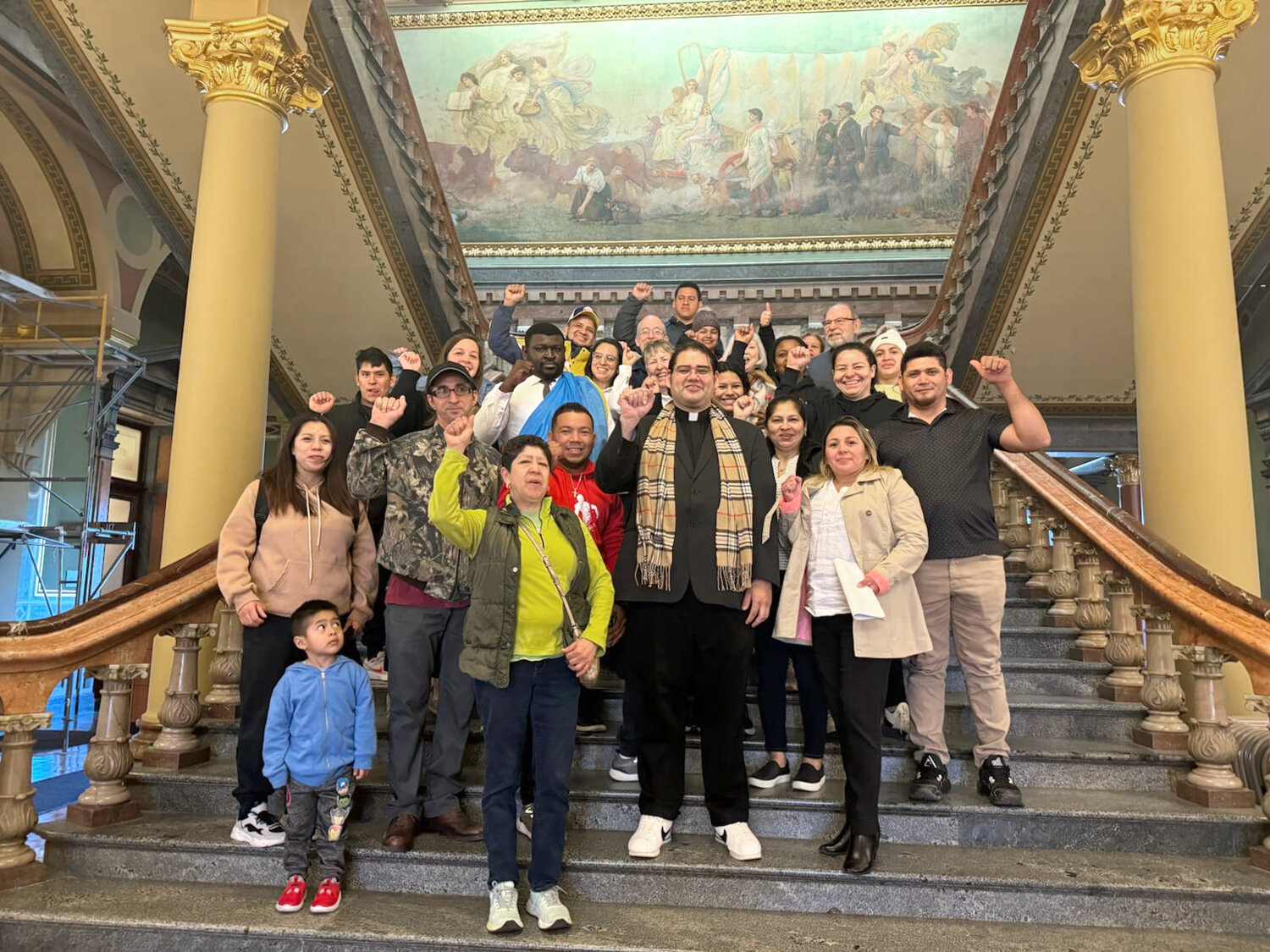Escucha Mi Voz takes stand at state capitol
Organization against four bills it considers to be anti-immigration
A series of bills before the Iowa legislature target the Latino community and low-income families according to Escucha Mi Voz Iowa.
The organization has called on House Speaker Pat Grassley and Senate President Amy Sinclair to embody the ideals of Christ, asking them to:
“Block floor votes on anti-immigrant legislation criminalizing returning refugees, undocumented students, advocates of faith, and essential workers without papers.”
Escucha Mi Voz Iowa is based in Iowa City, with deep roots in West Liberty due to the community’s growing minority majority in the area.
The organization made headlines in West Liberty when they asked the West Liberty City Council to distribute American Rescue Plan Act (ARPA) funds to community members.
Ultimately, the council approved $120,000 to the West Liberty Ministerial Association for utility bill relief, due to the faith-based, member-led, immigrant rights organization.
On Monday, Feb. 12, immigrant and refugee members of Escucha Mi Voz Iowa travelled to the State Capitol to stand against four bills they consider to be anti-immigration.
The group addressed the International Relations Committee of the state legislature, where they testified before the committee, delivered a letter to the Speaker of the House and met with the Speaker of the Iowa Senate.
The most controversial of the four bills they oppose is Senate File 2211, which would allow state courts to deport undocumented immigrants without prosecution.
Specifically, it will empower Iowa law enforcement to arrest undocumented immigrants and grant judges the discretion to order their return to their home countries instead of prosecuting them.
The Senate Judiciary Committee voted to move forward with the bill mid-February, renaming it senate file (SF) 2340 in the process.
“Ash Wednesday is the beginning of Lent and I’m saddened and disappointed to hear that the Senate Judiciary Committee has marked the season by hardening their hearts to the cries of the poor,” stated Escucha Mi Voz Iowa co-president Rev. Guillermo Trevino, Jr.
Rev. Trevino is the pastor at St. Joseph Catholic Church in West Liberty and St. Joseph Catholic Church in Columbus Junction.
“Allowing state police to racially profile immigrant workers and separate them from their families without a hearing is not only an unconstitutional waste of state resources, but also a violation of the Violence Against Women Act, the Convention Against Torture, and the Gospel mandate to welcome the stranger and love thy neighbor,” he stated.
“Immigrants and refugees are essential workers and Iowa farms and businesses can’t produce food, build homes, or turn a profit without their labor,” he added.
The other bills include Iowa House Bill 2320, which requires proof of citizenship or lawful presence in the country for a student to be eligible for in-state tuition and fees at institutions and community colleges.
The bill passed the House Judiciary Committee on Feb. 1, and would cost immigrant students who attend Iowa’s colleges more than $20,000 a year according to the organization.
House File 2112 requires noncitizens to submit documentation to prove their legal residency in the U.S. to be eligible for public assistance.
Escucha Mi Voz believes the bill will make it a felony to help undocumented immigrants and could criminalize transporting immigrants to check-ins and appointments.
Meanwhile, Senate File 108 will “Sabotage essential workers and employers by requiring Iowa businesses to use the federal E-verify program to block employment of undocumented immigrants.”
“Immigrant and refugee students and workers are essential to Iowa businesses and the economy, and these bills would unfairly and cruelly separate hardworking families from their children,” stated the organization.
The bills will, “Deny them the ability to provide for their loved ones, potentially in violation of federal and international law,” it added.
Ed Moreno is the president of LULAC council 310 in West Liberty, a member of the school board and works for the Board of Diversity Services of Iowa out of Muscatine.
“This is going to be detrimental to our school district and the community,” he says of the bills sitting in the Iowa House.
“I’m having a hard time believing these legislators are listening to and seeing who they’re representing,” he says. “We’re celebrating 25 years of the Dual Language Program.”
The program, offered by the West Liberty Community School District for grades Kindergarten through 12, aims to make students bilingual, bi-literate, and multicultural.
In a community where nearly 60 percent of the population is Hispanic or Latino, it has aided English Language Learners to develop multilingual skills.
Meanwhile, the League of United Latin American Citizens (LULAC), has focused on Latino outreach and advocacy, civic engagement, and youth education in West Liberty.
In spring of 2023 LULAC awarded twenty-one scholarships for a total of $25,000 and is looking to do so again in 2024.
Meanwhile, the Citizenship Project, which offers citizen classes has aided more than 50 community members in their effort to become citizens of the United States.
All of this to say, West Liberty has embraced its Latino population.
“To me there’s such a disconnect between what these bills are and what they’re trying to do versus what is possible and who we are in West Liberty,” says Moreno.
“The narrative is false that is being portrayed in these bills, I think it’s very damaging to our community in ways that people don’t understand,” he adds.
The American Immigration Council states that six percent of Iowa residents were born in another country, and five percent are native-born Americans who have at least one immigrant parent.
In fact, nearly two out of five immigrants in Iowa are naturalized citizens according to the AIC. As of 2018, 68,344 immigrants (39 percent) have become citizens.
However, according to AP VoteCast, about 4 in 10 Caucus goers chose immigration as the most important issue facing the country.
It’s a heated debate that has only picked up during the current election season in Iowa and the rest of the United States.
That being said, Escucha Mi Voz and LULAC encourage community members to make their voices heard at the state level.
“Community members in West Liberty need to step up and tell the true narrative,” says Moreno. “It’s something we can do, something we should do and something we will do.”
Comments

